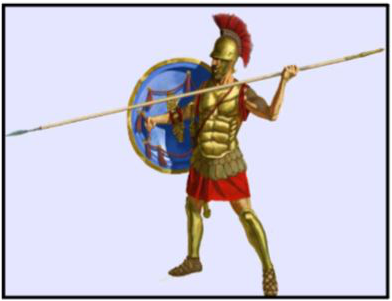
Field Report from the Front Lines
Directions:
You will act out a news report from the battlefield during one of ancient Greece's great wars. You should decide as a team what sort of reporting you would like to do - a battlefield interview, simple descriptive reporting from the battle, or a combination (please see me if you have questions about the differences). During your Field Report be sure to include who is fighting, why the two sides are fighting, when the battle takes place, where the battle takes place, and the outcome of the battle (why is the battle historically important?), as well as any other information you think is important.
Directions:
You will act out a news report from the battlefield during one of ancient Greece's great wars. You should decide as a team what sort of reporting you would like to do - a battlefield interview, simple descriptive reporting from the battle, or a combination (please see me if you have questions about the differences). During your Field Report be sure to include who is fighting, why the two sides are fighting, when the battle takes place, where the battle takes place, and the outcome of the battle (why is the battle historically important?), as well as any other information you think is important.
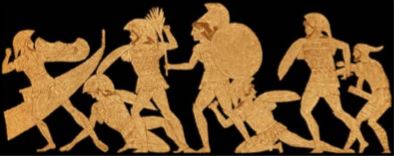
As a team you will write a script and act out your report on camera. Your battlefield report will become a part of your History Block's news cast. Your report will be about 5 minutes long.
In order to conduct a successful report you will need to perform the following tasks:
In order to conduct a successful report you will need to perform the following tasks:
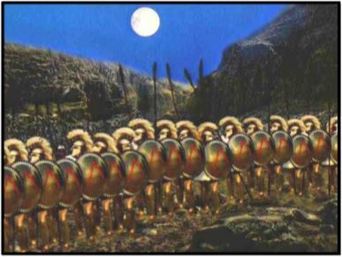
1. With your partners, you should brainstorm ideas for subtopics that relate to the battle
that you choose to report on.
2. To begin your research, collaborate with your partners to come up with 15-20 questions.
3. Research your subject.
4. Work together to develop thoughtful
answers to your questions and record your answers on your worksheet.
5. Write your script. Give special thought to how you organize your information for the report.
Be sure to include other information you feel is important or would be of interest.
You should prepare your news report in a professional manner.
that you choose to report on.
2. To begin your research, collaborate with your partners to come up with 15-20 questions.
3. Research your subject.
4. Work together to develop thoughtful
answers to your questions and record your answers on your worksheet.
5. Write your script. Give special thought to how you organize your information for the report.
Be sure to include other information you feel is important or would be of interest.
You should prepare your news report in a professional manner.
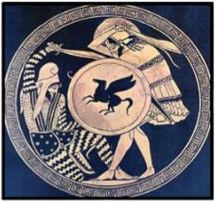
If you do a "live" battlefield report from the scene of one of ancient Greece’s great battles you should first pick a fight. Options include:
- The siege of Troy during the Trojan War
- The battle at Marathon during the Persian War.
- The battle at Thermopylae during the Persian War.
- The battle at Salamis during the Persian War.
- The siege of Athens during the Peloponnesian War
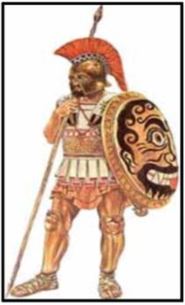
If this is your news segments, you should keep the following in mind: You may interview soldiers, commanders, or citizens as part of your report. If you choose to do this as part of your news reporting, you should make your interview subject’s "position" clear. Make sure the viewer knows whose side your interview subject is on and what role they play in the conflict.
You may also simply report from the battle field. Remember, the goal of news reporters is to remain neutral to their story. Don't take sides. Instead, during your battlefield news segment, simply report the facts.
Checklist:
1) You provide a neat, organized copy of your script for your interview. (15 points) _____
2) Your report tells the class about the causes for war and the historical importance of the battle, in addition to other important facts. (50 points) _____
3) Your report shows that you have practiced. Be loud, clear, and well organized. (10 points) _____
4) You keep track of your sources and correctly fill out and turn in a source list. (10 points) _____
5) You correctly complete and turn in your task lists and peer evaluations. (10 points) _____
6) I get 5 points to award or take away depending on how focused you are in class and how well you work together as a team.
Total Points: 100 points possible.
Extra Credit: You can earn an additional 5 points for dressing like an ancient Greek and including at least two props. You can earn an additional 10 points for filming a 30 second "commercial." See me for details.
You may also simply report from the battle field. Remember, the goal of news reporters is to remain neutral to their story. Don't take sides. Instead, during your battlefield news segment, simply report the facts.
Checklist:
1) You provide a neat, organized copy of your script for your interview. (15 points) _____
2) Your report tells the class about the causes for war and the historical importance of the battle, in addition to other important facts. (50 points) _____
3) Your report shows that you have practiced. Be loud, clear, and well organized. (10 points) _____
4) You keep track of your sources and correctly fill out and turn in a source list. (10 points) _____
5) You correctly complete and turn in your task lists and peer evaluations. (10 points) _____
6) I get 5 points to award or take away depending on how focused you are in class and how well you work together as a team.
Total Points: 100 points possible.
Extra Credit: You can earn an additional 5 points for dressing like an ancient Greek and including at least two props. You can earn an additional 10 points for filming a 30 second "commercial." See me for details.

